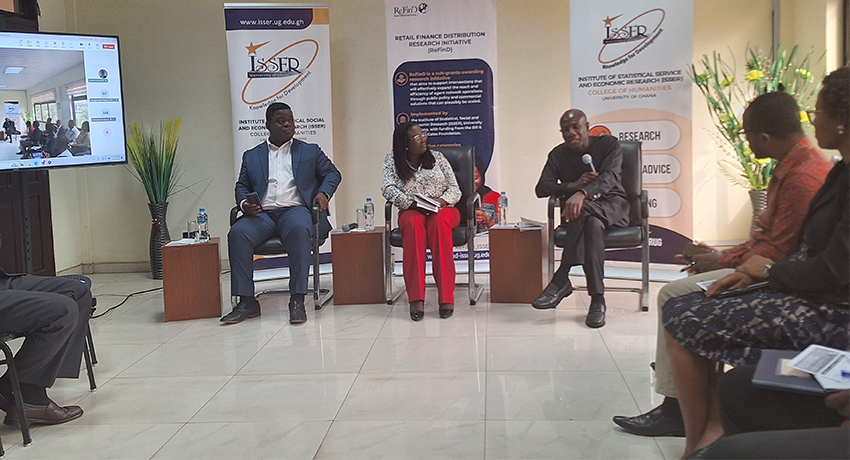Prof. Peter Quartey and MTN Group’s Mr. Ebenezer Asante foster an enriching dialogue on the economic impact of MTN in Africa and potential collaborative opportunities with academia, moderated by ReFinD Project Director Adadzewa Otoo.
ISSER convened a fireside chat featuring Mr. Ebenezer Asante, Vice President of Markets at MTN Group, to explore the topic of "MTN’s Economic Development Impact in Africa: Areas for Collaboration with Academia." The event served as a platform for stakeholders to delve into strategies for enhancing industry-academia collaboration within Ghana's digital finance landscape.
Beyond insights into the guest speaker's inspiring personal and professional journey, and MTN’s impactful role in Africa, participants gained insights on the opportunities in big data at MTN and how academia can leverage this to facilitate research for innovation and development. Discussions also highlighted the challenges hindering effective collaborations between industry-academia and how these could be addressed.
In his opening remarks, Prof. Peter Quartey, Director of ISSER and Executive Director of ReFinD, underscored the vital role of industry-academia collaborations in aligning academic pursuits with industry needs. The joint event forms part of activities and engagements of the ISSER-based ReFinD research initiative, aiming to expand ISSER’s research and policy advocacy presence in the data economy, notably in agent network operations.
Mr. Asante echoed the significance of collaboration between academia and industry, stating, "It’s about time industry collaborated with the likes of ISSER…" to effectively drive innovation for development.
The event attracted distinguished officials from MTN and the University of Ghana. These included Prof. Felix Asante, Pro Vice Chancellor at the Office of Research and Institutional Development (ORID), and Prof. Robert Darko Osei, Dean of the School of Graduate Studies (SGS), whose presence greatly enriched the dialogue, yielding valuable insights.

Exploring effective collaboration avenues
Participants identified that a key disconnect between industry and academia was in defining funding objectives. SGS Dean, Prof. Osei noted that this “disconnect” between industry and academia has led to “superficial” collaborations.
On one hand, industry requires a direct business case to fund whiles academia requires grant capital for research, whose impact might be long term. Participants agreed that this was due to the absence of enabling policy such as tax related incentives to encourage industry to make significant investments in research. Nonetheless, there was consensus that while advocacy is being advanced for enabling national policies to facilitate research funding, academia should explore opportunities in demand driven research related to the operational/opex budget of industry. Research related to the operation of industry could be more easily financed under operational cost.
Responding to this, the Pro ice Chancellor of ORID, Prof. Asante urged MTN to communicate their research needs to academia, emphasizing the importance of aligning research directions for effective collaboration. “Let us know your direction so that we can feed in,” he stated.
Beyond this, the MTN Group Vice President of Markets proposed alternative collaboration approaches beyond funding. These could include collaborations that allow access to the telecommunications giant’s data for teaching, learning and research. Also research institutions could secure support from industry as implementation partners to enhance their applications for research grants. Additionally, MTN could support talent development initiatives such as career fairs, providing teaching resources to universities, innovation competitions or hackathons for students, among others.
Joining forces for effective collaborations
To take the outcomes of the discussions forward, Mr. Asante noted that successful collaborations require time and the commitment of the people seeking it. He challenged the University of Ghana to approach industry in a structured manner, instead of silo requests from individual departments, for impact. “The first thing we can do is to move this to the highest level…let’s structure it to minimize fragmentation and the lack of focus.”
Prof. Quartey revealed that ISSER has embarked on the development of a dedicated data repository, aimed at hosting essential data and research evidence on agent networks. He also highlighted a collaboration with the Ministry of Finance and financial sector regulators to develop a unified financial inclusion database for Ghana. These, he said, represent opportunities for collaboration with industry, with great potential for impact across the development of the digital finance ecosystem in Ghana.
The joint ISSER-ReFinD fireside chat fostered an environment conducive to open and meaningful dialogue, allowing participants to explore various avenues of collaboration between academia and MTN. This event stands as a significant contribution to ISSER's ongoing efforts, particularly within the ReFinD research initiative, aimed at elevating the role and influence of research in shaping the data economy, with a specific emphasis on advancing financial inclusion through agent networks.
It was held on January 31, 2024, at ISSER.

- Log in to post comments

